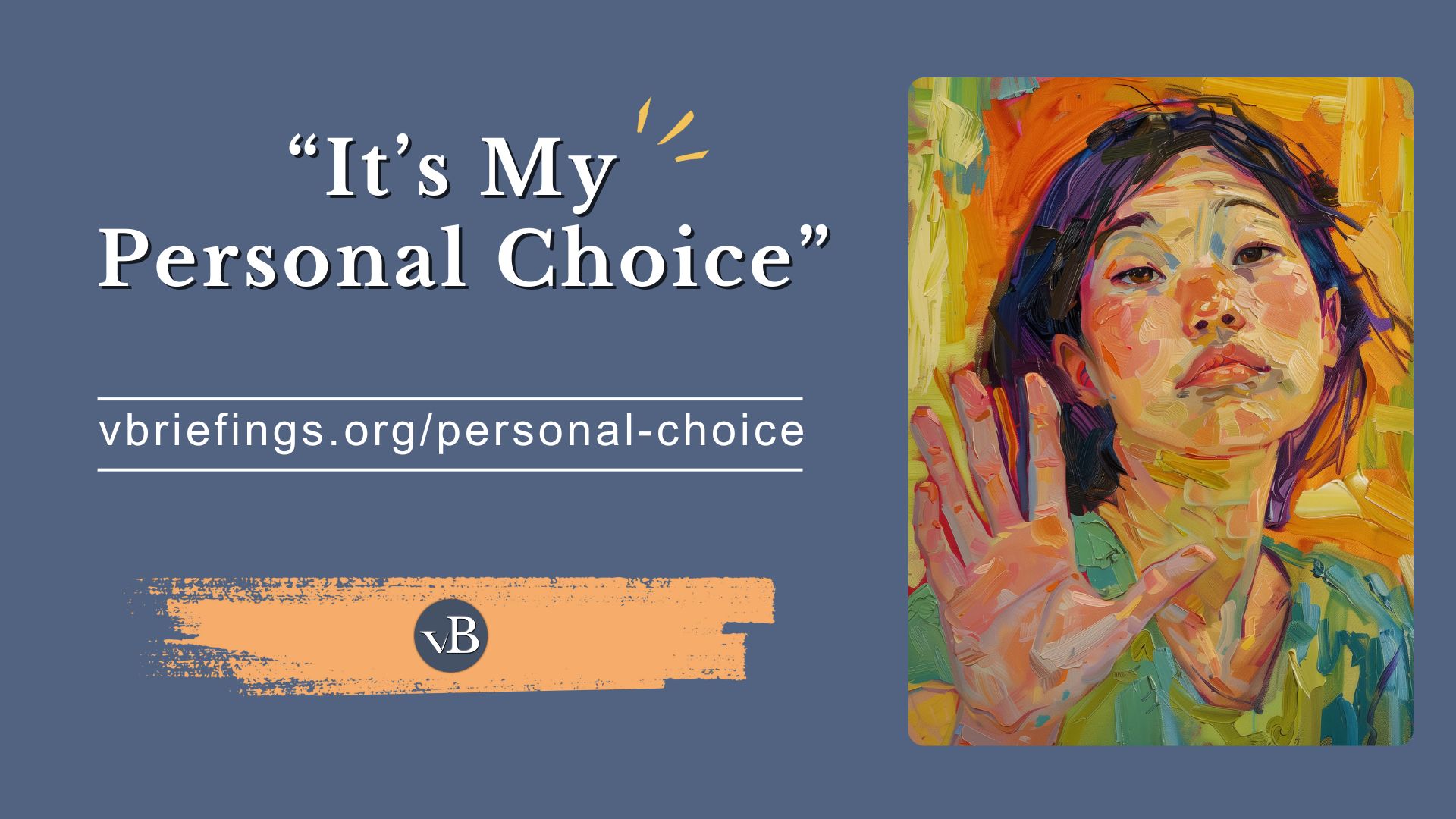Preface
Briefing description and more.
In answering this objection to veganism, we show how personal choice cannot be used to justify actions that are unethical.
Companion Videos
How to use companion videos
Videos may be posted on multiple social media platforms, and you can share them on each platform according each platform’s conventions.
Share this Briefing
Social Media Sharing Image
This image will be used when sharing the briefing on a social media platform. You can see all social sharing images in the grid view.

How to share this briefing
Click on the icon for the platform on which you wish to share. What happens next depends on the platform, but generally a popup will appear, letting you add your own text as you share.
Briefing Meta
Metrics
Note: we will publish additional briefings after completing flashcards and presentation slides for selected briefings.
Counts:
| Main Text | |
| Key Points | 5 |
| Counterclaims | 1 |
| Supplementary | 1 |
| Further Study | 3 |
| Footnotes | 3 |
| Media & Advocacy | |
| Advocacy Notes | 9 |
| —Socratic Questions | 15 |
| Flashcards | 19 |
| Presentation Slides | 0 |
| Memes & Infographics | 0 |
| Companion Videos | 0 |
Other Meta:
Date Posted:
Last Edited:
Edit Log:
Key Points Links
Loading…
Help Us Improve
Please send your suggestions for improvements, or report any issues with this briefing to team@vbriefings.org
We appreciate that you are taking the time to help up improve. All suggestions and reports will be carefully considered.
Summary
A concise summary of the briefing (see below for citations).
Personal choices are not inherently ethical simply because they can be made, as history shows with examples like slavery and gender-based pay inequity. While it is possible to respect a person, some of their choices, such as consuming animal products, may still be unethical and cause suffering. Greater awareness of the harm caused by these choices can shift perspectives, showing that such decisions are far from being merely personal and carry significant ethical weight.
Context
Places this topic in its larger context.
This objection to animal rights and veganism is made by those who are not aware of the implications of eating animals or by those who are aware but are unwilling to change.
The objection is often accompanied by a statement such as, “I respect your right to be vegan; you should respect my right to not be vegan.”
Key Points
This section provides talking points.
Personal choices are not necessarily ethical.
Just because it is a choice you personally make does not make it an ethical choice.
- Example: you may choose to be rude to someone because of their gender or skin color.
The fact that you are not legally restricted from such an action does not imply the action is ethical.
Declaring one’s personal choice can be and has been used to defend all manner of indefensible positions:
- “It’s my personal choice to own slaves.”
- “It’s my personal choice to pay women less money than men for the same work.”
It’s not just a personal choice.
It is a personal choice in the sense that it’s a choice you can personally make, but for any choice to be only a personal one, all those affected must give consent.
- Example: I may personally choose to cut in front of you in line in the grocery-store, but unless I get your permission, it negatively affects you.
If it involves harming others, then it is as much a social choice as it is a personal choice. As the saying goes, “Your right to swing your fist ends where my nose begins.”
Some choices have victims.
It is inescapable that eating meat and animal secretions (such as milk, cheese, and eggs) harms animals. See our briefings on injustices and suffering for details.
When we choose to buy animal products, we are not just ignoring the victim—we are complicit in the violence and suffering the victim has endured.
We are complicit because even though we are not inflicting harm directly; we are paying someone else to do so.
Respect for a choice is not the same as respect for a person.
Although it is difficult if not impossible to respect choices you consider to be unethical, just because you do not respect all the choices of someone does not mean you don’t respect the person making those choices.
Awareness changes your perspective.
When you become fully aware of the harms resulting from eating animals or their products, it is impossible to view it as merely a personal choice.
When you take a little time to educate yourself on the atrocities inflicted on animals before they become the food on your plate, you will be less likely choose to harm other sentient beings whose lives are as important to them as yours is to you.
Counterclaims
Responses to some yes but retorts.
Claim: We don’t have free will (an idea known as determinism), so we only think we have a choice anyway.
Deterministic claims, if used in this context, could be employed to justify absolutely anything.
The employment of determinism to justify immoral actions undermines the basis for ethical decision-making by suggesting all actions are equally justifiable, ignoring the moral distinctions between them.
Supplementary Info
Additional information that may prove useful.
Pertinent Quotes:
- Humans are experts at rationalizing their choices, as Ben Franklin expressed when he said, “So convenient a thing is it to be a reasonable creature, since it enables one to find or make a reason for everything one has a mind to do.”1
Further Study
Sources providing a deeper understanding of the topic or related topics.
From Other Resources
This Stanford paper discusses the role of choice in the context of free will: Free Will.2
For a more rigorous treatment of moral perspectives on personal choices see The Structure of Moral Revolutions.3
Advocacy Resources
Information to help with outreach and advocacy.
Note: we will publish additional briefings after completing flashcards and presentation slides for selected briefings.
Share This Briefing
Cloned from the Preface Section on page load.
Companion Videos
Cloned from the Preface Section on page load.
Memes and Infographics
No images found.
How to use Memes and Infographics
To sequence through all memes and infographics on this page, click on any image than use the arrow keys or the arrow buttons to show next and previous images.
To share a meme or infographic, right click on the image and choose download or save as. Then upload the image to the platform of choice.
Presentation Slides
Slides not available.
How to Use the Presentation Slides
You can view the slideshow full screen by clicking on the first link above.
To use Canva presenter mode, view the speaker notes, or download the slides as PowerPoint, login to Canva (the free account works) and follow the Full Canva Link provided above.
To copy this presentation to your own Canva project, use the Full Canva Link provided above, then select File->Make a Copy from the upper left. You can build your own unique presentation from multiple briefings by copying the presentation from each briefing and then building another presentation from the copied presentations.
Flash Cards
We partner with Brainscape because of their excellent features for learning. You will need to create a free Brainscape account to study the cards.
Go to Flash Cards: This will take you to a list of decks.
About Flash Cards and Brainscape
Flash cards are here to help you commit important facts and concepts in this briefing to memory.
In Brainscape, there is one deck for each briefing. You can study more than one deck at a time. Brainscape uses spaced repetition to promote memory retention. It is “the secret to learning more while studying less.”
You can study using your browser, but Brainscape also has a free mobile app that makes learning anywhere easy.
Socratic Questions
Socratic-style questions are embedded in the Advocacy Notes below, and shown in italics.
These are open-ended, thought-provoking questions designed to encourage critical thinking, self-reflection, and deeper understanding. They are inspired by the Socratic method, a teaching technique attributed to the ancient Greek philosopher Socrates, who would ask his students probing questions rather than directly providing answers.
The goal is to help people examine their beliefs, clarify their thoughts, uncover assumptions, and explore the evidence and reasoning behind their ideas.
Advocacy Notes
Tips for Advocacy and Outreach
General Tips
This objection requires only logic to counter, not facts. Your goal is to help them realize their choices impact others—and that ethical choices require deeper reflection.
Reassure them that veganism isn’t about taking away choices—it’s about making better ones.
This objection is sometimes an implicit admonition to back off, motivated by a desire to avoid discomfort or scrutiny, rather than an invitation to engage in meaningful dialogue.
Segue the Conversation Back to Animal Ethics
Ask questions that can lead the conversation back to animal ethics.
- “I used to think the same way. But once I learned what animals go through, I couldn’t keep pretending it was just a personal choice. Have you ever looked into what happens in farms and slaughterhouses?”
- “Don’t you think it’s important to know the full consequences of our personal choices?”
- “If you discovered your choice was causing immense suffering, would you still see it as just ‘personal’?”
- “If someone’s choice impacts others, should they take responsibility for the harm it causes?”
Shift the Focus: Not All Choices Are Ethical
People should not assume that because they have the freedom to choose something, that choice is beyond moral scrutiny. Get them to examine that assumption.
- “Just because we can make a choice doesn’t mean it’s ethical. Would you say child labor or paying women less for the same work is fine just because it’s a ‘personal choice’?”
- “Can you think of any past injustices which were justified on the rationalization of personal choice?”
- “Can you think of any other situation where ‘it’s my personal choice’ would justify harming others?”
Why? This forces them to recognize that some choices have ethical consequences and can’t just be waved away as “personal.”
Help Them See That Their Choice Involves Victims
People say “personal choice” as if it only affects them. Make it clear that someone else is paying the price.
- “It’s a personal choice in the sense that you can make it—but so is cutting in line. Does that make it right?”
- “If it were truly personal, it wouldn’t involve someone else suffering. Would you say it’s just a personal choice for a farmer to hit a dog?”
Why? This breaks the illusion that their decision exists in isolation.
Use the Golden Rule
Most people already believe in the golden rule—do unto others as you would have them do unto you. Use that against their argument.
- “If you were in the animal’s place, would you accept the excuse that it’s ‘just a personal choice’?”
- “Would you accept someone saying, ‘It’s my personal choice’ if they were harming a dog? Why treat farmed animals differently?”
Why? This forces them to apply their own moral standards consistently.
Differentiate Between Respecting People and Their Choices
Sometimes, people say, “I respect your choice to be vegan, so you should respect my choice not to be.” But respect for a person doesn’t mean respecting all their choices.
- “If we truly respect someone’s autonomy and dignity, must we also respect every decision they make, even when those decisions appear to cause harm to others?”
- “I respect you as a person, but does that mean I have to respect every choice you make—especially if it harms others.”
Why? This distinguishes between respecting people and holding them accountable for harmful choices.
Ask Them to Apply This Logic to Other Situations
When people say, “I have the right to choose what I eat,” they are really saying, “I have the right to ignore the harm my actions cause.” Help them see how flawed that reasoning is.
- “What if someone said, ‘I have the right to drive drunk because it’s my personal choice’? Would you accept that reasoning?”
- “Imagine if someone said, ‘It’s my personal choice’ to take something that doesn’t belong to them. Would that be okay?”
Why? This exposes the weakness of their argument by applying it to other ethical dilemmas.
Footnotes
Our sources, with links back to where they are used.
- Franklin, Benjamin. The Autobiography of Benjamin Franklin. Amazon Classics, 2017. 48-49. ↩︎
- O’Connor, Timothy, and Christopher Franklin. “Free Will (Stanford Encyclopedia of Philosophy).” Stanford.edu, 3 Nov 2022, plato.stanford.edu/entries/freewill/. Accessed 7 Mar. 2024. ↩︎
- Baker, Robert. The Structure of Moral Revolutions. The MIT Press EBooks, The MIT Press, 1 Jan. 2019, direct.mit.edu/books/monograph/4568/The-Structure-of-Moral-RevolutionsStudies-of. Accessed 7 Mar. 2024. ↩︎




